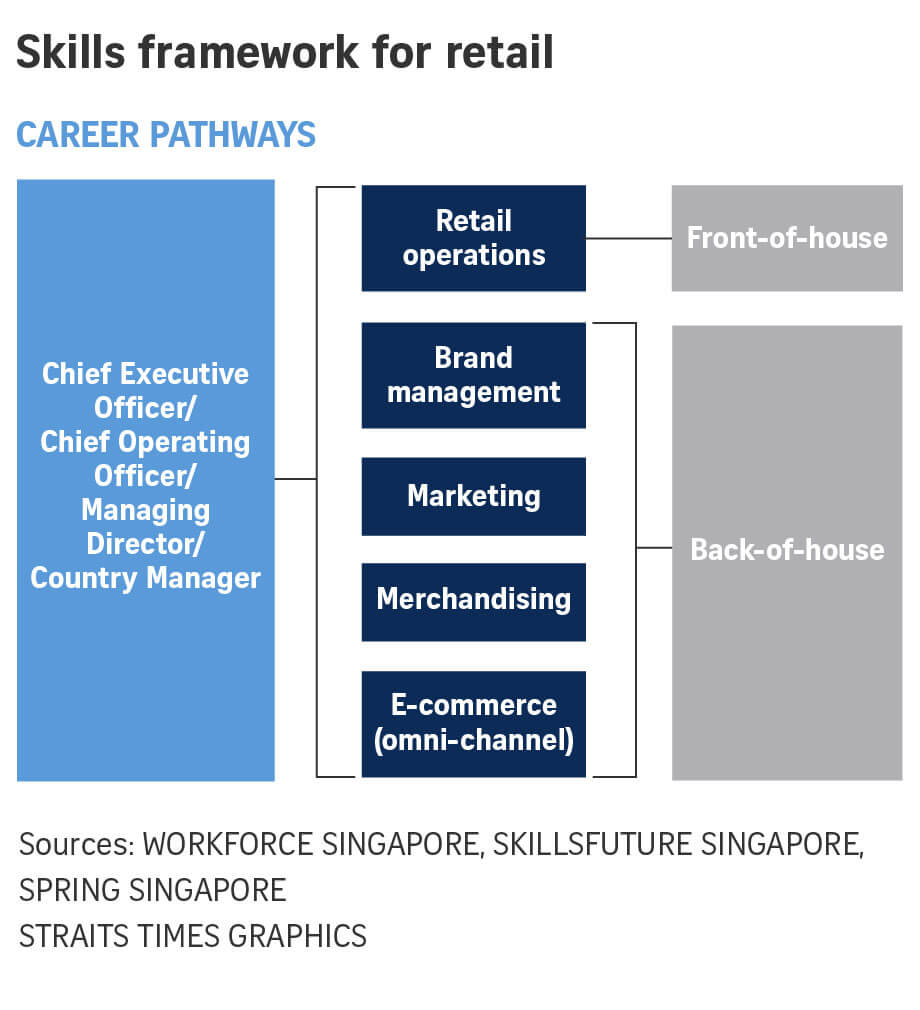SINGAPORE - Job-seekers in the retail and food services industries will get more help identifying the skills they need and the career pathways that are available with new skills frameworks for the two sectors on Friday (Aug 4).
The guides were launched by Workforce Singapore (WSG), SkillsFuture Singapore (SSG) and Spring Singapore as part of a Government push for businesses to adopt innovative technologies and go manpower-lean.
The shift to more technology-enabled operations and resulting redesigned job roles requires employees to upgrade their skills or reskill to remain relevant, the agencies said in a release.
The guides are available on the SkillsFuture website, and map out seven tracks in the food services industry, such as food and beverage service, and five tracks in the retail sector. The latter includes brand management and e-commerce.
WSG grants and programmes are available to help employers offset the costs of technology implementation and training, plus wage subsidy support.
Speaking at the launch at the Lifelong Learning Institute, Second Minister for Manpower Josephine Teo said that food services and retail are key industries of the Singapore economy, contributing to more than three per cent of GDP and employing about 11 per cent of the workforce.
"Both industries have faced manpower constraints in recent years, but businesses are adjusting and overcoming the manpower hurdle, often through more intensive use of technology," she said.

Since 2010, more than 3,000 retail and F&B enterprises have invested in capability development, such as digital services and automation.
Technology is also helping businesses with older workers, said Mrs Teo, who noted that more than half of employees in food services and retail are aged 40 and above.
Apart from job-seekers, employees and businesses, education and training institutes can also use the skills frameworks to align programmes with the needs of the industry, he said.
The two-day Adapt and Grow event includes a career fair offering close to 1,200 jobs from 34 employers including Timbre and Robinsons RSH. It also showcases technology solutions from both sectors that employers can tap on to raise productivity and redesign jobs and work processes.
These include virtual reality technology for retail and the use of tablets as menus and "e-waiters" for F&B establishments.
Mr Ng Cher Pong, chief executive of SSG, said: "Trends, such as increased automation in the food services industry and the growth of e-commerce in the retail industry, provide new business and career opportunities. To seize these opportunities, the workforce will need to he equipped with new skills."
Mr Muhammad Effendi, a senior marketing executive at furniture and electronics retailer Courts, said that he has undergone job rotations and training in skills such as data analytics and social media marketing during his four years at the company.
"It's not difficult to learn these things but you have to keep your mind open as what you learn today may not be relevant tomorrow," he said.
Technologies like virtual reality are helping to bridge the gap between online and offline," said Mr Effendi, 28.
Furniture company Commune, one of the exhibitors at the event, worked with IT company Dimension 5 to create a virtual reality programme that allows customers to visualise and measure furniture pieces against the dimensions of their home.
Customers can use the VR headset in-store and snap a 360-degree photo of their design that can be sent to their mobile device.
"Customers would come in and measure the furniture and need to go back and check, and most people also have problems visualising so we wanted to come up with a solution," said Commune's chief executive Joshua Koh.
The service has rolled out to three of its four stores in Singapore since last October, and sales have increased by 20 to 25 per cent year-on-year, said Mr Koh, 34.
A desire to go manpower-lean led Muthu's Curry to adopt tablets and watch-like "wearables" by Samsung at its three restaurants earlier this year.
Customers can place orders through the tablet, while requests such as for water or the bill will show up as an alert on the device worn on all servers' wrists.
Mr Srinivasan Ayyakannu, director of operations for Muthu's Currinary, said the company has invested about $250,000 for the technology and software. "We wanted to improve efficiency due to the manpower shortage," he said.
"It's helped us operationally... it reduces man hours working to and fro and servers have more time to interact with guests," he said.
But it has also come with drawbacks, as the average bill has dropped by about 10 per cent since the implementation of the tablets.
"Previously the waiter taking the order could recommend a medium fish head curry for a table of three but now customers go for the smaller one," said Mr Srinivasan, 39.
Using a tablet also means that the kitchen can get overwhelmed with customers placing orders at the same time, he said.
Mr Cyrus Ivan Subramaniam Krishna, 46, was looking for a job as a restaurant manager at the career fair on Friday.
Mr Cyrus, who has 15 years of experience in various kitchen roles and has been unemployed for three months, said that his dream is to open his own cafe.
"It's important to keep upgrading your skills, especially in this job market, or you'll lose out," he said.


